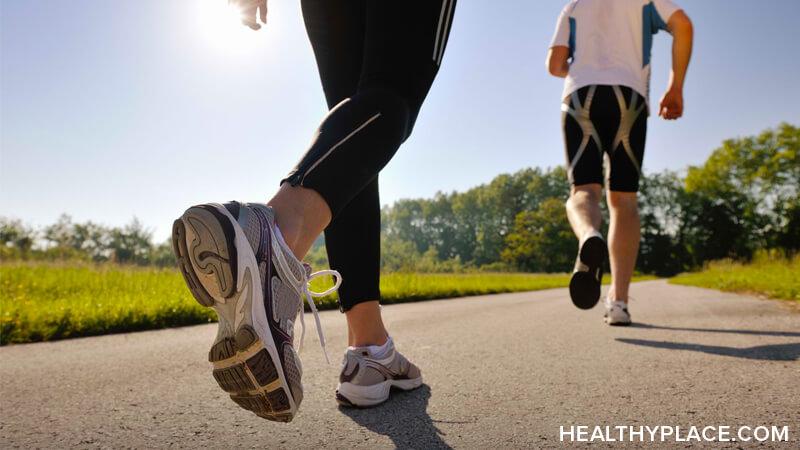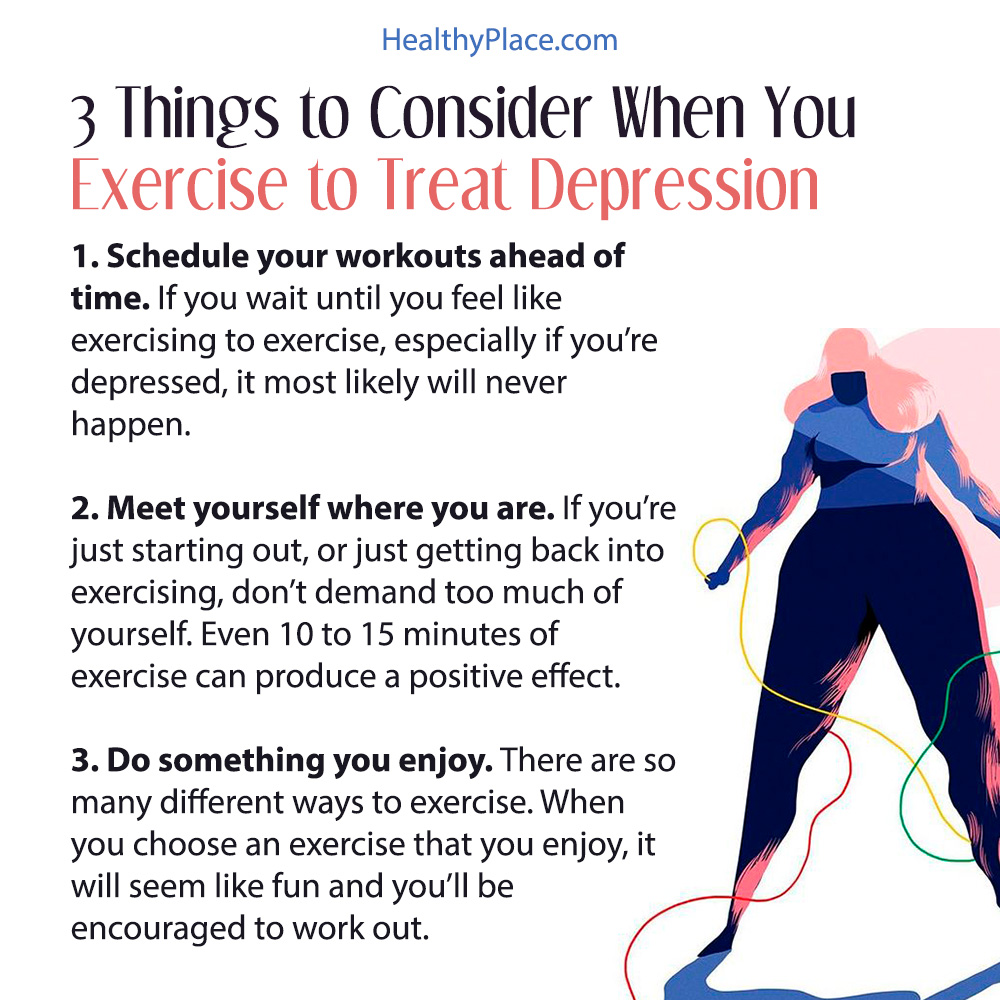How to Exercise to Help Treat Depression
 Choosing exercise to help treat depression is a great idea. Not only does it release feel-good endorphins, it allows for social interaction as well as gives structure to our days. In this post, I share how to exercise to help treat depression as well as three things to consider when you exercise to help treat depression.
Choosing exercise to help treat depression is a great idea. Not only does it release feel-good endorphins, it allows for social interaction as well as gives structure to our days. In this post, I share how to exercise to help treat depression as well as three things to consider when you exercise to help treat depression.
Choose the Right Exercise to Help Depression Treatment
You must consider the amount, duration and intensity of exercise to help treat depression the right way. We need to be consistent in order to reap the possible antidepressant benefits of exercise. Research tells us that doing 30 minutes or more of exercise a day, for three to five days a week, can significantly improve depression symptoms.1 A Duke University research study found that “although antidepressants may help with a quicker initial therapeutic response than exercise, after 16 weeks of treatment exercise was equally effective in reducing depression among patients with major depressive disorder.”2
A study by The Cooper Institute has shown that intensity or difficulty of exercise is a key factor in improving mild to moderate depression.3 However, other findings show that for patients with a low level of fitness, moderate-intensity exercise (60%–80% maximum heart rate) is often more enjoyable than more intense activities. Also, people are roughly half as likely to drop out of a moderate-intensity exercise program compared to a vigorous-intensity exercise program.4
While a higher level of intensity might be better to help treat depression, if we burn out or quit the program altogether because it’s too intense, then we’ll be back to square one.
3 Things to Consider When You Exercise to Help Treat Depression
- Schedule your workouts ahead of time. If you wait until you feel like exercising to exercise, especially if you’re depressed, it most likely will never happen. Remember that motivation often comes after action. So, schedule your workouts into your calendar ahead of time rather than waiting until you feel inspired to exercise.
- Meet yourself where you are. If you’re just starting out, or just getting back into exercising, don’t demand too much of yourself. If an hour or 30 minutes of exercise seems too difficult, take comfort in the fact that even 10 to 15 minutes of exercise can produce a positive effect.
- Do something you enjoy. Why choose a form of exercise that you find boring or too difficult? There are so many different ways to exercise. You can run, bike, or hike outdoors. There’s swimming, yoga, and dance classes. Even a 20-minute walk with a friend might be beneficial. When you choose an exercise that you enjoy, it will seem like fun and you’ll be encouraged to work out.
Please check out my video below on exercising with a purpose to help treat depression. Also, be sure to read How Exercise Helps with Depression, my first post in my series on depression and exercise.

Sources
- Mayo Clinic, Depression and anxiety: Exercise eases symptoms. Accessed March 27, 2018.
- Blumenthal, JA, Effects of exercise training on older patients with major depression. NCBI. October 25, 1999.
- The Cooper Institute, Depression Outcomes Study of Exercise. Accessed March 27, 2018.
- Craft, Lynette, The Benefits of Exercise for the Clinically Depressed. NCBI. Accessed March 27, 2018.
APA Reference
Sedas, M.
(2018, March 29). How to Exercise to Help Treat Depression, HealthyPlace. Retrieved
on 2025, December 6 from https://www.healthyplace.com/blogs/copingwithdepression/2018/03/how-to-exercise-to-help-treat-depression
Author: Michelle Sedas
Exercise w/ depression is a struggle for me. I get depressed at the gym, seeing all the regulars, men and women alike, chatting and in such great shape and only getting stronger, sleeker and better while I stumble & stagnate. Now that warm weather is here I'm hoping to exercise more outside which I find much more enjoyable. I'm glad I found this blog! Thanks!
Hello Christian,
Thank you for your comment. Exercising when I'm depressed can be a struggle for me as well. I hope the warmer days will allow you to exercise outside. I think that's a great plan. Thank you!
Michelle Sedas
Social life is complex issue that encompass good and bad moments with hurting effects to our mental health. As a result we may suffer from any emotional disorder, where depressive inclination is the most hard and serious outcomes. In fact, today depression indicate the main mental and somatic disease that tremendously ruins our global life functioning, including our health statement. So it is urgent and important initiative to undertake something through daily life to ameliorate the dangerous repercussions of depression. Your genuine positive experience with exercise exhibits great tool to overcome unbearable emotional sad of depression. Indeed, any exercise type present active and inventive way to improve and to avoid the hard tightening from this emotional depletion, such is depressive disorder. it goes without saying, that the form, duration and intensity of exercise should be scheduled by personal and individual features, circumstances and possibilities. Surely, depression as psychiatric entity must be under close supervision of experienced clinical psychiatrist, where exercise indicates supplement therapy of depression.
Dr. Ferati,
Thank you for your comment!
Michelle Sedas
People with anxiety and depression that don't exercise really don't realize how much it helps. It helps me. A big difference for me when I exercise and when the many days I don't. For me, jogging and hiking are the best. I like hiking because it makes you focus on the moment. You are concentrating on the trail, steep hills, and the scenery. Definitely mindfulness in action. I like jogging because you can sweat and think at the same time. Nothing like a short walk after a jog to clear your mind and to try to put life into its true perspective. Exercise is the most simplest and primitive form to deal with anxiety, depression, and motivation. It helps me. Nice articles and hopefully it motivates others to action.
Hello John,
This is a great comment. Thank you for taking the time to post. "Exercise is the most simplest and primitive form to deal with anxiety, depression, and motivation." That's awesome! Thank you!
--Michelle Sedas